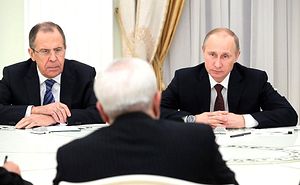On January 10, Iran’s Foreign Minister Javad Zarif met with his Russian counterpart Sergey Lavrov in Moscow to discuss the resolution of the Syrian civil war and U.S. President Donald Trump’s threats to suspend the Iran nuclear deal. After their meeting, Zarif praised Russia’s resolute support for the implementation of the Iran nuclear deal, and reiterated both countries’ shared willingness to preserve the territorial integrity of Syria.
Even though Zarif’s recent meeting with Lavrov aimed to showcase the strength of the Russia-Iran alliance to the international community, the long-term sustainability of the Moscow-Tehran alignment remains unclear. The uncertainty surrounding the survival of the Russia-Iran partnership can be explained by both countries’ conflicting strategic visions for the Middle East regional system.
Russia’s strategic vision is chiefly focused on eliminating sources of instability and preventing U.S.-led military interventions, which from Moscow’s perspective facilitate the creation of failed states. The Russian government justified its September 2015 military intervention in Syria as a necessary measure to restore stability to the country, and to deter Washington from using force to overthrow Syrian President Bashar al-Assad. Russia views its Syria campaign as an integral step toward achieving its broader goal of establishing itself as an indispensable guarantor of collective security in the Middle East.
Although Iranian policymakers frequently tout Tehran’s role as a stabilizing force in the Middle East, collective security promotion is only a peripheral goal in Iran’s strategic vision. Iranian policymakers are primarily focused on expanding Tehran’s sphere of influence in the Middle East and containing Saudi Arabia’s power projection capacity across the Arab world. These expansionist objectives have caused Iran to cooperate more extensively with belligerent nonstate actors than Russia and engage in military activities that undercut the effectiveness of Moscow-backed political settlement initiatives.
These divergent objectives threaten to unravel Russia-Iran cooperation in Syria, as the conflict transitions from the military to diplomatic phase. Even though Russian military officials have praised the effectiveness of Hezbollah troops during pro-Assad military operations, Iran’s use of Syrian territory to create a permanent transit point for weaponry to Hezbollah has alarmed Russian policymakers who seek to preserve strong relations with Israel.
Iran’s unwillingness to suspend military operations in Syria until Assad has completely vanquished opposition forces also deviates from Russia’s more limited objective of ensuring that Assad controls enough territory to negotiate with Syrian opposition factions from a position of strength. Iran’s belief in the feasibility of a military solution in Syria has made it less willing than Russia to diplomatically engage with Syrian opposition or Kurdish factions during diplomatic negotiations, limiting the scope of the Moscow-Tehran partnership.
Prospects for constructive cooperation between Russia and Iran on resolving other regional conflicts, like Yemen and Afghanistan, also appear dim. In Yemen, the already-strained relations between Russia and Iran-aligned Houthi rebels have deteriorated further since the assassination of former President Ali Abdullah Saleh on December 5. These tensions have prompted Moscow to establish stronger lines of communication with Saudi Arabia and the United Arab Emirates (UAE) on resolving the crisis.
A similar divergence in objectives restricts the potential for Russia-Iran cooperation in Afghanistan. Russia is seeking to implement an Afghan political settlement, which includes the Taliban, as swiftly as possible. While Iran wants a peace settlement in Afghanistan to be achieved in the long term, it is unwilling to suspend military action until anti-U.S. forces have gained a position of primacy in western Afghanistan. As Iran continues to provide military assistance to Taliban forces near its borders, Russian policymakers are concerned that Tehran will obstruct the Afghan peace process to advance its own objectives.
Although divergent interests make the Russia-Iran partnership weaker than many analysts have assumed, U.S. policy choices could also profoundly impact the strength of the alliance. As former U.S. Ambassador to Russia Michael McFaul noted in a August 2017 interview, the reimposition of a stringent U.S. sanctions regime against Iran by abandoning the nuclear deal could cause Tehran to pivot strongly toward Moscow. If the United States decides to militarily retaliate against Assad’s use of chemical weapons, it will likely reawaken Russia and Iran’s long-standing opposition to U.S. military interventions, further strengthening their partnership in Syria.
Although a marked improvement in Washington’s relationships with Russia or Iran is unlikely to occur in the near-term, U.S. policymakers can influence the trajectory of the Russia-Iran relationship. To capitalize on disagreements between Russia and Iran’s Afghanistan strategies, U.S. diplomats could re-establish diplomatic dialogue with the Taliban, which would provide a genuine basis for U.S.-Russia cooperation in Afghanistan and isolate Iran’s support for a military solution from the international consensus.
U.S. policymakers could also attempt to strengthen dialogue between Geneva and Astana talk participants in Syria. This move would give Russia the status recognition it desires, and weaken the Moscow-Tehran partnership, as Iranian policymakers remain concerned that heightened Russia-U.S. cooperation will cause Moscow to distance itself from Tehran, like it did during the early years of the Obama administration.
Even though the Russia-Iran alliance appears robust, both countries’ divergent strategic visions could render the partnership unsustainable in the long-term. To weaken the Russia-Iran alignment, U.S. officials should refrain from implementing overly hawkish retaliations to Moscow and Tehran’s destabilizing conduct, and look to expose cracks in the partnership through targeted diplomatic engagement with Russia. If U.S. policymakers implement this strategy, the Moscow-Tehran partnership could weaken considerably once military operations in Syria draw to a close, potentially strengthening Washington’s influence in the Middle East for years to come.
Samuel Ramani is a DPhil candidate in International Relations at St. Antony’s College, University of Oxford. He is also a regular contributor to the Washington Post, The Diplomat and The National Interest. He can be followed on Twitter at samramani2. This article has previously been published on the EastWest Institute Policy Innovation Blog.

































